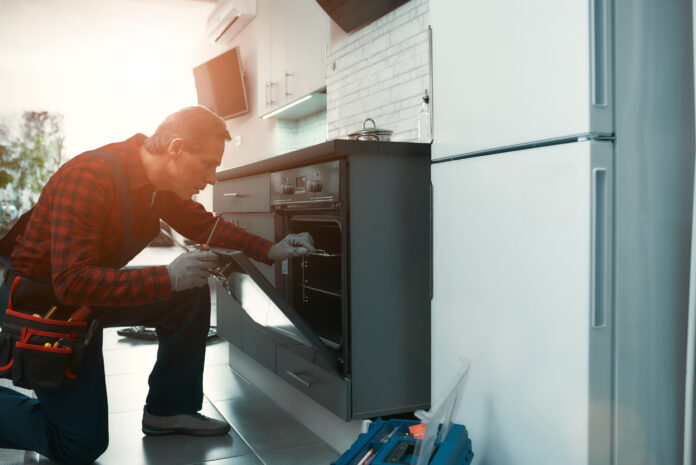It’s not always easy to know when you should repair or replace an appliance as many different factors come into play when it comes to this decision. What is more cost effective? How long is the average lifespan of the appliance? What are the options if you do decide to replace them?
These are all important questions to ask before making a decision, and we’ve got answers. If you’re noticing that your appliances are not running properly, or you think they could be on their last legs, then you’ll want to keep reading to figure out the best options for you.
Average Lifespan of Appliances
To begin, let’s talk about the average lifespan of the most common household appliances. Some appliances last longer than others, so it’s important to be aware of their differences. For example, if you purchased your compactor at the same time as your electric range and they’re both starting to experience issues, only one might be worth repairing.
Compactors typically have an average lifespan of 6 years. Dishwashers and microwaves will both last you around 9 years, while washers, freezers, and hood fans last about 10 years. Refrigerators, electric ranges, gas ranges, and dryers last anywhere from 11 to 15 years.
While this is just a general rule of thumb, it’s helpful to keep in mind during your decision making process. It’s also always a good idea to check if your appliance is still under warranty, as many appliance brands offer free or discounted labour and parts for a year after purchase. If you have an extended warranty, you could be covered for up to 2 years.
The 50% Rule
If you’re still on the fence about whether or not you should repair or replace an appliance, even after you’ve taken into consideration its average lifespan, then review the 50% rule.
The 50% rule is pretty simple. Basically, it asks you to factor in the cost of a repair versus the cost of a replacement. If the appliance in question is 50% through its lifespan, and the cost of repairing it is 50% more than the cost of buying new, then you should replace it. However, if the appliance is still young and the estimated cost for a one time repair is low, it’s a smart idea to repair it.
You’ll need to do some research in order to implement the 50% rule. First, find out the average lifespan of your appliance. Next, shop around for a new appliance that offers the same or upgraded features. Take note of the prices and possible sales that could occur in the future. Next, you’ll have to get a repair estimate from a trusted appliance technician. In order for the technician to give you an estimated repair quote, they will have to assess the problem in person, which takes time. Most companies have a “trip charge” to diagnose a problem you’re having with your appliance, and these charges can vary quite widely. When you call to inquire about the estimate, make sure you ask about this fee so you’re not taken by surprise.
Calculating Cost
Now let’s talk about some other factors, including unexpected costs, that you might run into when repairing or replacing your appliances.
Swapping Out for Energy-Efficient Models
Maybe you’re considering replacing your older appliances for newer, energy-efficient ones, even if they’re currently working fine. While many energy-efficient appliances can be cost effective and help you save on your energy bills, it’s not always the best choice for everyone. Depending on your situation, replacing old appliances that still have time left on them may work against you, and your bank account.
Investing in energy-efficient appliances in order to save money on your electricity bill is a great decision if you currently do not have the appliance you’re going to purchase, or you’re planning on staying in your home for the next 10 to 15 years. However, if you already have the appliance and you’re planning on moving in the next few years, you won’t benefit from the savings.
Hidden Costs of Repairs
While repairing can be a great solution for newer appliances, sometimes there are hidden costs. This includes the price tag of the repair, but also the time and energy you put into it. Planning an estimate, having a technician come over to repair the appliance, and scheduling any follow-up appointment can take a lot of time out of your days. Time is money, and even if the problem seems easy to solve at first, there’s a possibility that the technician will run into issues along the way. On top of that, you could be paying more for labour costs, additional parts that need to be ordered, and even shipping costs.
Purchasing a new appliance all together, within reason, could end up saving you more time and money in the long run. Shipping and delivery costs can be waived, seasonal promotions, and free installation can all come along with the purchase of a new appliance. Some stores even offer free removal of old appliances, as long as the old item is disconnected.
If you choose to purchase a new appliance, you can look into services that purchase old electronics for parts. They can either recycle the broken item for you, or they can give you money in exchange for it. You could also try to find an organization that accepts donated items, as some will accept appliances if they’re still in working condition or have a chance to be repaired.
So, What’s Next?
Ultimately, it’s up to you to weigh the pros and cons of repairing or replacing your appliances. What’s best for you will depend on your situation. Variables include whether or not you’re planning on moving soon, if you can’t find a good deal on repairs, and whether or not you have the time it could take to conduct a repair.



















